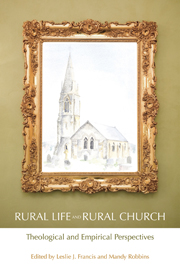Book contents
- Frontmatter
- Contents
- Preface
- Foreword by The Bishop of Shrewsbury, The Rt Revd Mark Rylands
- 1 Introduction: shaping rural theology
- PART 1 PERSPECTIVES FROM THE BIBLE
- PART 2 PERSPECTIVES FROM ORDINARY THEOLOGY
- PART 3 THEOLOGICAL AND SOCIOLOGICAL PERSPECTIVES
- PART 4 HISTORICAL PERSPECTIVES
- PART 5 LISTENING TO VISITORS
- 15 I was glad: listening to visitors to country churches
- 16 Sacred place and pilgrimage: modern visitors to the shrine of St Melangell
- 17 Visitor experiences of St Davids Cathedral: the two worlds of pilgrims and secular tourists
- PART 6 LISTENING TO THE COMMUNITY
- PART 7 LISTENING TO CHURCHGOERS
- PART 8 LISTENING TO CHURCH LEADERS
- PART 9 SATISFACTION AND STRESS IN MINISTRY
- Contributors
- Sources
- Subject Index
- Name Index
15 - I was glad: listening to visitors to country churches
from PART 5 - LISTENING TO VISITORS
- Frontmatter
- Contents
- Preface
- Foreword by The Bishop of Shrewsbury, The Rt Revd Mark Rylands
- 1 Introduction: shaping rural theology
- PART 1 PERSPECTIVES FROM THE BIBLE
- PART 2 PERSPECTIVES FROM ORDINARY THEOLOGY
- PART 3 THEOLOGICAL AND SOCIOLOGICAL PERSPECTIVES
- PART 4 HISTORICAL PERSPECTIVES
- PART 5 LISTENING TO VISITORS
- 15 I was glad: listening to visitors to country churches
- 16 Sacred place and pilgrimage: modern visitors to the shrine of St Melangell
- 17 Visitor experiences of St Davids Cathedral: the two worlds of pilgrims and secular tourists
- PART 6 LISTENING TO THE COMMUNITY
- PART 7 LISTENING TO CHURCHGOERS
- PART 8 LISTENING TO CHURCH LEADERS
- PART 9 SATISFACTION AND STRESS IN MINISTRY
- Contributors
- Sources
- Subject Index
- Name Index
Summary
Abstract – A major national visitors' survey asked visitors and tourists to rural churches to rate on a five-point scale how much they liked to find certain features when they visit churches. Of the 12,757 individuals who completed the rating scales, 765 took the additional effort to add further personal comment. The qualitative data arising from these personal comments have not previously been evaluated. The present analysis of these data provides a valuable guide to visitors' views about the provisions churches should make for visitors and tourists.
Introduction
Writing in the introduction to the Church in Wales report, Rural Wales Consultative Document, Robin Morrison (2003) recognizes the need to reconstruct the future of our rural communities. He goes on to ask questions about the role, to this end, of all relevant agencies, including that of local churches. ‘How will the churches have to change’, he asks, ‘in order to engage in new ways?’ The report concludes with wide-ranging ideas and proposals among which are key recommendations concerning local churches. Included among these recommendations is the statement that churches should open their doors and let the world rediscover their true role. The report goes on to insist that many local churches need a massive image make-over, and that clergy need to be more people friendly, welcoming, proactive, open, and involved.
This notion of churches needing an image make-over is taken up by others. Indeed, given a backcloth of controversial trends in what some see as challenges to the orthodoxy of the Anglican Church, coupled with financial difficulties and falling attendance, it is perhaps not surprising to find that there is a trend among theological writers to see major changes in the way the Anglican Church should present itself.
- Type
- Chapter
- Information
- Rural Life and Rural ChurchTheological and Empirical Perspectives, pp. 180 - 187Publisher: Acumen PublishingPrint publication year: 2012



